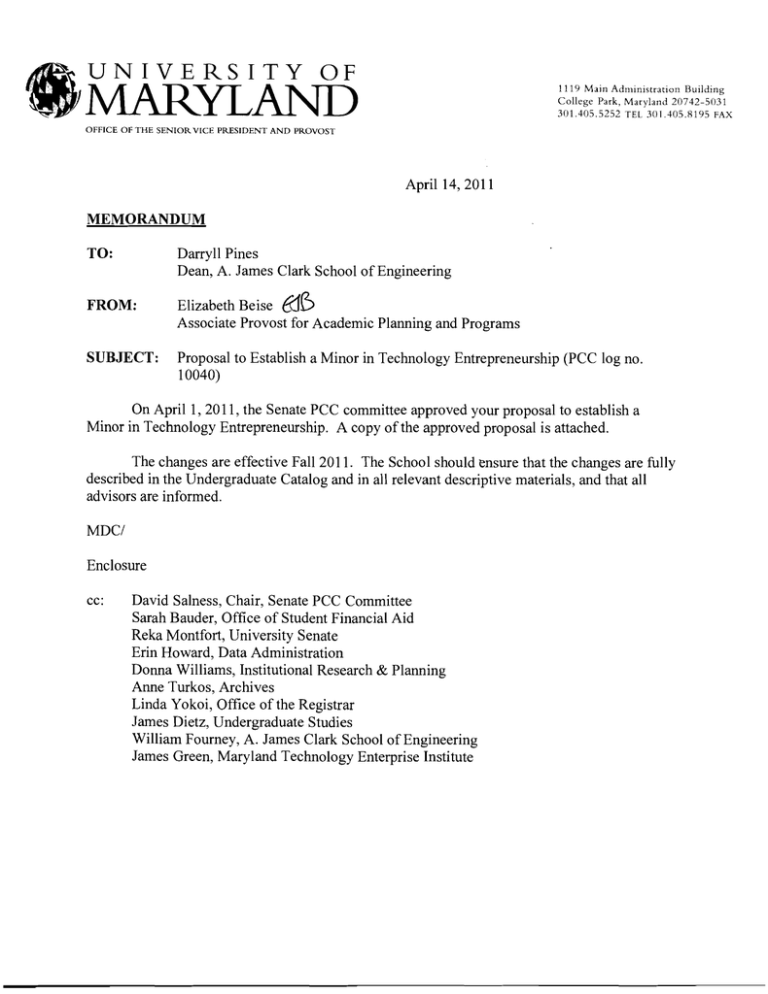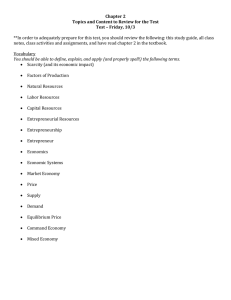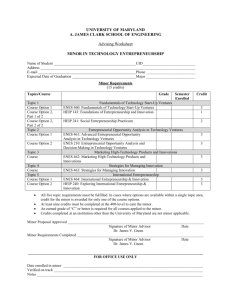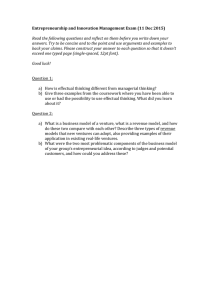·········MARYLAND .• '..,.•....."' UNIVERSITY OF •
advertisement

.• '..,.•. ."' UNIVERSITY OF
•
·········MARYLAND
1119 Main Administration Building
College Park, Maryland 20742-5031
301.405.5252 TEL 301.405.8195 FAX
OFFICE OF THE SENIOR VICE PRESIDENT AND PROVOST
April 14,2011
MEMORANDUM
TO:
Darryll Pines
Dean, A. James Clark School of Engineering
FROM:
Elizabeth Beise eft)
Associate Provost for Academic Planning and Programs
SUBJECT:
Proposal to Establish a Minor in Technology Entrepreneurship (PCC log no.
10040)
On April 1, 2011, the Senate PCC committee approved your proposal to establish a
Minor in Technology Entrepreneurship. A copy of the approved proposal is attached.
The changes are effective Fall 2011. The School should ensure that the changes are fully
described in the Undergraduate Catalog and in all relevant descriptive materials, and that all
advisors are informed.
MDCI
Enclosure
cc:
David Salness, Chair, Senate PCC Committee
Sarah Bauder, Office of Student Financial Aid
Reka Montfort, University Senate
Erin Howard, Data Administration
Donna Williams, Institutional Research & Planning
Anne Turkos, Archives
Linda Yokoi, Office of the Registrar
James Dietz, Undergraduate Studies
William Fourney, A. James Clark School of Engineering
James Green, Maryland Technology Enterprise Institute
THE UNIVERSITY OF l\IIARYLAND, COLLEGE PARK
PROGRAl\'I/CURRI CUL UlVI/UNIT PROPOSAL
IPee LOG NO.
10040
C()lIege/School: A. James Clark School of Engineering
College/School Unit Code-First 8 digits: 01203200
Unit Codes COli belinmd at: hftps:///n/lpl'od,I1md.cdu/Htlllf Re/lr>rr,\J,lI1its.htlll
DepartmentJPI"ogl"am: Maryland Technology Enterprise Institute (Mtech)
Department/Program Unit Code-Last 7 digits: 1321101
Type of Adlon (choose one):
a Curriel! IUIll change (includ ing informal specializutions) a Nell academic degreeIt:IIH/lY! program
a Renamin,f? of program o rfi.>J'ma I Area of'Conccntratioll a New Professional Studies award iteration
a Addition/deiNioll offi'rl1lal Area ofConc(!11fratioll
IKI New 1\·1inor
a Suspend/delerc program
o Other
!f1I lirs imli,'<!le /lUll [/11' pmpos,'d program aelion milsl hI' {'n's,'lIIet! 10 I!I.. III II U lIil'i'fsily S""11II~ ./fIr nmsideral iOI1.
Summary
or Proposed
Action: Establish a new undergraduate "Minor in Technology Entrepreneurship"
===:==:=======.============:============'===============:=====:==============.==.==============
APPRO VAL S IG NATUR ES - Please prim IJall/t', sig/l, and "ate. USt~ additional/illt's for lIIulti-ulIit programs.
1. Department (' ommiltee Chair
_:Y
. .\-.....:;./:A_\r_._'
. _b _~--=:..;~_...:.~.::....::::...J~
I
'...:.o.=.-.I'-'Z=-\4-I_~_o"'"-
Department Committee Chair
'\ DeparunentChair
Department Chair
\-\ to
~ be (\1"
~ ,. ~\\',\
_
\0
J. CollegelS\..'hool PeC Chair
College/SdlOof
Pee Chair
4. Dean
Dean
5. Dean of the Gr:lduate School (if reql:ired)
6. ChaIr, Senate
-7;=\
pcc~() Mad ;;'Lf1 ~
1
tt)')ll
PROPOSAL TO ESTABLISH A NEW UNDERGRADUATE MINOR IN
"TECHNOLOGY ENTREPRENEURSHIP"
JUSTIFICATION FOR THE MINOR AS A COHERENT FIELD OF STUDY
A firm grasp of the entrepreneurial process and mind-set benefits every person engaged in developing
technology. Our goal is to infuse technology-creating students with that knowledge and its
accompanying skills. Armed with an entrepreneurial mind-set, technology creators drive economic
growth by launching successful ventures and bringing life-changing products and services to market.
CATALOG DESCRIPTION
The minor in Technology Entrepreneurship will prepare students for launching successful technology
ventures and bringing life-changing products and services to market. The minor will develop the
entrepreneurial mind-set and functional skillsets of students to improve their ability to create, launch,
and manage technology ventures. Students may earn a minor in Technology Entrepreneurship by
completing coursework which focuses on entrepreneurial opportunity analysis, marketing high­
technology products, strategies for managing innovation, and international entrepreneurship and
innovation.
LIST OF COURSES
The IS-credit minor will consists of five topic areas that may be fulfilled from nine courses taught by
Mtech. The Minor encompasses many existing courses required by the two living-learning
entrepreneurship programs on campus, Hinman CEOs and Erp, thereby enhancing the experience of
these students and increasing the likelihood of strong student enrollments in the minor. The minor will
also be open to all undergraduates of the campus who are accepted into the minor program.
At least 9 credits must be completed at the upper level to earn the minor. While course options are
available for several topic areas, application of 100 and 200-level courses is limited to a total of 6 non­
upper level credits.
1. Topic: Fundamentals of Technology Start-Up Ventures
Course Option 1: "ENES 460: Fundamentals of Technology Start-Up Ventures". This course helps
students learn the processes and skills needed to launch and manage technology start-up
ventures. Students will learn how to assess the feasibility of a startup venture, as well as how to
apply best practices for planning, launching, and managing new companies. Students will
discuss a wide range of issues of importance and concern to entrepreneurs and learn to
recognize opportunity, assess the skills and talents of successful entrepreneurs, and learn
models and approaches that help them navigate uncertainty. 3 credits.
-or­
2
Course Option 2: The second option to fulfilling this topic requirement is to complete two
courses, a one-credit course and a two-credit course, as listed below.
(a) "HElP 143: Foundations of Entrepreneurship and Innovation". This course
introduces foundational ideas and terms in entrepreneurship and innovation, with attention to
developing students understanding of cultivating a business in diverse, global environments;
leading and collaborating in a competitive world; developing an entrepreneurial mind for an
entrepreneurial world; imd industry dynamics of technological innovation. 1 credit.
-and­
(b) "HEIP 241: Social Entrepreneurship Practicum". This capstone course is for
enhancing strategic capabilities and leadership skills through the development of an innovative
for-profit product or service concept with social benefits. 2 credits.
2. Topic: Entrepreneurial Opportunity Analysis in Technology Ventures
Course Option 1: "ENES ·461: Advanced Entrepreneurial Opportunity Analysis in Technology
Ventures". This course explores the factors that influence entrepreneurial opportunity analysis
in technology-based ventures, to include, but not limited to, software, IT, biotech, and energy
startups. Using a cognitive theoretical framework the course examines the integration of
motivation, emotions and information processing modes to make complex entrepreneurial
decisions in fast pace technology venture environments. The course is an informed and
interesting exploration of entrepreneurial cognition with both theoretical and methodological
contributions for active ,md aspiring student technology entrepreneurs. 3 credits.
-01'­
Course Option 2: "ENES210: Entrepreneurial Opportunity Analysis & Decision-Making in
Technology Ventures". This interdisciplinary course helps students learn the principles of
entrepreneurial opportunity analysis and decision-making in an increasingly dynamic and
technically-inclined society. Emphasis is placed on how aspiring technology entrepreneurs can
develop their entrepreneurial mindset and opportunity recognition capabilities to develop
winning entrepreneurial plans for future ventures. 3 credits.
3. Topic: Marketing High-Technology Products and Innovations
Course: "ENES 462: Marketing High-Technology Products and Innovations". Marketing of high­
technology products occurs in turbulent environments, and requires rapid decision making
with incomplete information. Innovations are introduced at frequent intervals, research-and­
development spending is vital, and there are high mortality rates for both products and
businesses. The course will provide a balance between conceptual discussions (based on
readings of concepts and practices) and appliedlhands-on analysis (industry analyses, cases,
guest speakers, and a semester project). 3 credits.
3
4.
Topic: Strategies for Managing Innovation
Course: "ENES 463: Strategies for Managing Innovation". This course emphasizes how the
technology entrepreneur can use strategic management of innovation and technology to
enhance firm performance. It helps students to understand the process of technological change;
the ways that firms come up with innovations; the strategies that firms use to benefit from
innovation; and the process of formulating technology strategy. It provides frameworks for
analyzing key aspects of these industries and teaches students how to apply these frameworks.
3 credits.
5.
Topic: International Entrepreneurship
Course Option 1: "ENES ·464: International Entrepreneurship & Innovation." This course focuses
on the need for every entrepreneur and innovator to understand the global market in today's
hypercompetitive world, and to appreciate how to compete effectively in domestic markets by
managing international competitors, suppliers, and influencers. As an ever-growing number of
countries become market oriented and developed, students explore how the distinction
between foreign and domestic markets is becoming less pronounced. Students also develop
skills to identify and manage opportunities on a global basis. 3 credits.
-orCourse Option 2: "HElP 240: Exploring International Entrepreneurship & Innovation". This
course provides an introduction to the opportunities and challenges of entrepreneurship and
innovation from an international perspective through lectures and guest speakers with
international experiences. 3 credits.
All courses counted toward the minor must be completed with a 2.0 or better.
LIST OF FACULTY OVERSEEING THE MINOR
Dr. James V. Green
Senior Lecturer
Director, Entrepreneurship Education, Mtech
A. James Clark School of Engineering
ADMISSIONS AND ADVISING
Admission and advising will be managed by Mtech's Director of Entrepreneurship Education in
collaboration with Mtech's Executive Director. A coordinator and an administrative assistant will
support this effort. Students will apply to the program on a rolling basis. To enroll in the minor,
students will complete an advising worksheet and meet with the minor advisory team. Student must
apply for the minor no later than one year before their graduation date.
4
ANTICIPATED NUMBER OF STUDENTS TO BE SERVED BY THE MINOR AT STEADY STATE
Within the Hinman CEOs living-learning entrepreneurship program managed by Mtech,
approximately 90 juniors and seniors are enrolling in 12 credits of coursework over their two years in
the Program. These 12 credits include 12 of the credits offered within this minor (ENES 461, 462, 463,
and 464). It is anticipated that 50% of the Hinman CEOs will complete the 5 th course required for the
minor. This alone accounts 50% of 90 students, or 45 students, that are expected to be served by the
minor.
Within the Entrepreneurship and Innovation living-learning program (EIP) managed by Mtech and the
Honors College, approximately 150 students are enrolling in 6 of the credits offered within this minor
(HElP 143, 240, and 241) . It is anticipated that 20% of these ElP students, or 30 students, will be served
by the minor.
Additionally, as the minor will be open to all undergraduate students on campus, it is expected that
these 75 students from Mtech's programs will be matched by another 75 student from throughout
campus to result in approximately 150 students being served by the minor at steady state.
5







